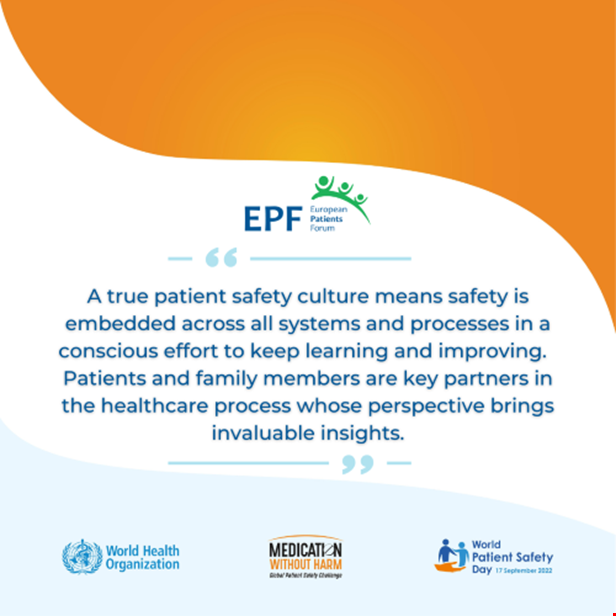World Patient Safety Day 2022 - Key takeaways

In 2019, the World Health Assembly adopted resolution WHA 72.6, “Global action on patient safety”, which recognised patient safety as a global health priority and endorsed the establishment of World Patient Safety Day to be observed annually on 17 September.
The theme of World Patient Safety Day 2022 is medication safety. WHO has adopted the slogan “Medication Without Harm”. WHO says medication-related harm accounts for the greatest proportion – 50% – of preventable harm due to unsafe care. According to a 2022 report by the OECD, one in five inpatients experience medication-related harm during hospitalisation, and as many as one in 10 hospitalisations may be caused by medication-related harm. The financial costs of all this have been estimated to surpass US$54 billion, before even considering the huge human costs to patients and their families.
The WHO’s 2022 campaign calls for a systems approach and actions to promote safe medication practices to prevent errors and reduce harm. Key risk areas are situations such as transitions of care, and taking multiple medications (polypharmacy). EPF supports the campaign for Medication Without Harm. Our work has particularly called attention to the need to empower patients and family members as active contributors to patient safety in healthcare environments, and in self-care.
A true patient safety culture means safety is embedded across all systems and processes in a conscious effort to keep learning and improving. This means that systems must be in place to catch errors and near-misses and draw lessons from them; there must be transparency and accountability; and it will mean a change in professional attitudes to develop true teamwork. Healthcare needs to let go of pernicious hierarchical traditions and perceived roles that can still prevent effective communication between professionals of different “ranks”, or between professionals and patients. Patients and family members are key partners in the healthcare process whose perspective brings invaluable insights.
- More information on the WHO 2022 campaign here
- More information on EPF’s work on patient safety here
Key Messages Of The 2022 Campaign
For policy makers and programme managers
- Ensure medication safety is addressed at all levels and in all settings in the health care system
- Assess the burden of medication-related harm in your country
- Integrate medication safety into every stage of patient care
- Co-design and implement medication safety programmes with stakeholders, including patients and public
- Establish a patient safety incident reporting and learning system, including medication safety incidents (medication errors and related harm)
- Monitor progress and evaluate the impact of medication safety programmes
- Launch Know. Check. Ask. as the medication safety campaign across the country
For healthcare leaders and managers
- Designate a focal point and a multidisciplinary team to develop processes to ensure medication safety in your facility
- Develop and implement standard operating procedures for safe medication use, taking into account the risk of human error
- Make sure there are sufficient staff to cover patients’ medication needs
- Provide opportunities to train health workers on safe medication use
- Operationalize a patient safety incident reporting and learning system, including medication safety incidents (medication errors and related harm)
- Create a safety culture where health workers are able to raise safety concerns related to medications
- Prioritize action in areas where most medication-related harm occurs, such as high-risk situations, transitions of care and polypharmacy
- Put in place strategies to reduce the risk of medication errors, such as double-checking, patient engagement and using information technology to improve processes
Health workers
- Keep your skills in safe medication practices up to date
- Engage patients through shared decision-making using tools such as the 5 Moments for Medication Safety and implement actions related to the Know. Check. Ask. campaign
- Provide clear and full medication-related information to all members of the clinical team throughout the process of care
- Report medication safety incidents, and share and apply lessons learned with your team and patients when possible
- Be mindful of situations where risk from medications is high and ensure safety measures are followed
- Mentor new members of your team on safe medication systems and practices
For patients
- When prescribed a medication, check with your health worker that you have all the information you need to take it safely. Follow the Know. Check. Ask. actions
- Keep an up-to-date list of all the medications you take, including traditional medicines, and share it with your treating health workers
- Take your medications as recommended by your health worker
- Use the 5 Moments for Medication Safety tool to keep you safe while taking your medications
- Be aware of the potential side-effects of your medications
- Store your medications as indicated and check the expiration date regularly
- Raise any concerns about your medication with your health worker
